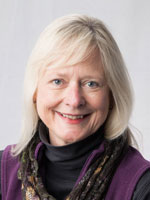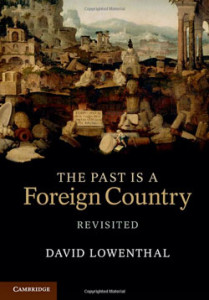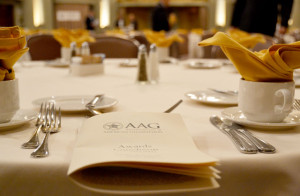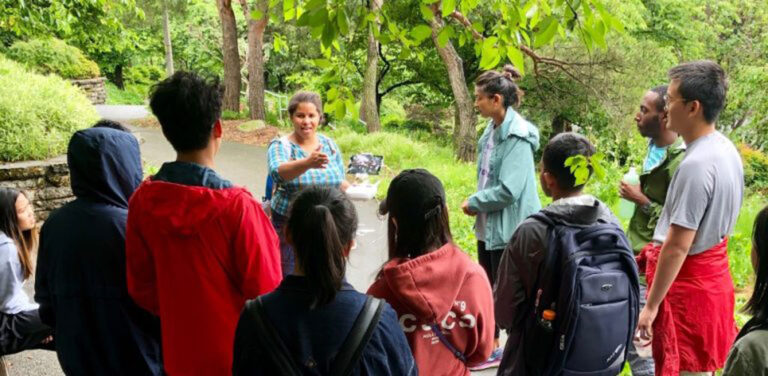Newsletter – December 2015
PRESIDENT’S COLUMN
A New Year’s Resolution

By Sarah Witham Bednarz
The fall semester is coming to an end and the new year is approaching. It is the season for reflection and resolution setting. What went well in my classes and research this semester? What do I need to tweak before offering the class again? What resources do I need to keep my research going? What new “thing” did my students come up with that I need to be mindful of as I plan for the spring? These are the ruminations of a seasoned professor. I know some of my younger colleagues are just too panicked about the chaos of teaching (and research and service) to have much time to consider their successes, strengths, challenges, and flaws. We geographers have paid close attention to early career faculty, primarily through the Geography Faculty Development Alliance and three excellent publications Practicing Geography, Aspiring Academics, and Teaching College Geography (available through the AAG Bookstore). This has been enormously helpful in producing a generation of young, astute, and savvy geographers. However, a group we have not paid much attention to is mid- and late-career faculty.
This is true across higher education. There is very little professional development to assist faculty after they receive tenure, and little has been written about strategies to support senior colleagues. Mid-career faculty especially face significant emotional and professional challenges. Institutions invest considerable resources to start careers but then, post-tenure, the training wheels are off and faculty are supposed to be successful in obtaining their own research funding. Early career faculty are often protected from service, but then, as associate professors, they are magically expected to become effective, engaged committee members and managers of academic programs. Many crumple under the high expectations placed on them by their departments, complaining that after tenure more work is dumped on them. In some instances mid-career faculty can feel neglected, receiving less attention and feedback, either positive or negative. The initial relief at gaining tenure can lead to dismay, a feeling of ennui, epitomized by the thought, “Now, what do I do?” Continue Reading.
Recent columns from the President
Geography Is Still an Important Part of K-12 Education Bill
By Doug Richardson and John Wertman
As you are likely aware, Congress has been working throughout 2015 to reauthorize the Elementary and Secondary Education Act (ESEA; currently known as No Child Left Behind) – the primary federal law dealing with K-12 education policy. We have been monitoring the process throughout the year and have engaged with Congressional leaders to stress the importance of federal funding opportunities for K-12 geography. We have also written to you multiple times to share key updates.
In recent months, the House and Senate each approved separate versions of ESEA reauthorization legislation, and two weeks ago, senior members from the two houses met to reconcile differences between the bills. The resulting “conference report” was released this week. Here’s our initial analysis:
The Every Student Succeeds Act (ESSA) is the name given to the House/Senate conference report for the current reauthorization of the Elementary and Secondary Education Act. The conference report will be voted upon by the House this week (possibly as soon as late this afternoon) and the Senate next week. If both houses approve it, the bill will go to President Obama for signature or veto. Learn More.
ANNUAL MEETING

Judith Butler To Give Plenary Talk at 2016 AAG Annual Meeting
Judith Butler, professor at the University of California at Berkeley, will give a plenary talk about “Demography in the Ethics of Non-Violence” at the 2016 AAG Annual Meeting on March 29 in San Francisco.
This high-profile session will focus on a principled approach to non-violence that often admits to exceptions where violence is conceded as legitimate. To what extent does the exception to nonviolence in the name of self-defense or for close kin implicitly make a distinction between lives worth saving and dispensable lives? A practice of non-violence has to take into account the demographic distribution of grievability that establishes which lives are worthy of safeguarding, and which are less worthy or not worthy at all. Otherwise, both biopolitics and the logic of war can permeate calculations about when and where non-violence can be invoked. Does the demographic challenge revise our approach to non-violence? and if so, how?” Learn More.
David Lowenthal To Speak at 2016 AAG Annual Meeting
Thirty years after his classic book, The Past Is a Foreign Country, David Lowenthal explores anew how we celebrate, expunge, contest and manipulate the past. In his major new work, The Past is a Foreign Country – Revisited, he reveals the past as an almost entirely new realm, so transformed over three decades as to demand an equally new book.
During a special AAG “Author Meets Critics” session at the 2016 AAG Annual Meeting in San Francisco, Lowenthal will talk about his new book, while panelists Diana K. Davis, UC Davis; Marie D. Price, George Washington University; and Dydia Delyser, CSU Fullerton, give their understandings and opinions on the new book. Learn more.
ASSOCIATION NEWS
AAG Election Coming Soon
The AAG election will be conducted online again, and will take place Jan. 11-Feb. 4, 2016. Each member who has an email address on record with the AAG will receive a special email with a code that will allow them to sign in to our AAG SimplyVoting website and vote. The 2016 election slate will be published soon, but for more information, visit the main election page. If your email address has changed in the past year, please take the opportunity to update it within your AAG member account.
 2016 AAG Honors Announced
2016 AAG Honors Announced
The AAG has announce the selection of eight Honorees who will receive the 2016 AAG Honors in one of six categories. Recipients to be honored at an annual awards luncheon during the AAG Annual Meeting are:
- Susan Christopherson, Cornell University, Lifetime Achievement Award
- George Malanson, University of Iowa, Lifetime Achievement Award
- Aaron Wolf, Oregon State University, Gilbert White Public Service Award
- Linda Mearns, National Center for Atmospheric Research, AAG Distinguished Scholarship Award
- Ibipo Johnston-Anumonwo, State University of New York, College at Cortland, Distinguished Teaching Award
- Kavita Pandit, University of Georgia, Ronald F. Abler Distinguished Service Honors
- Carrie Stokes, United States Agency for International Development, Gilbert White Public Service Award
- William R. Strong, Emeritus Professor, University of North Alabama, Gilbert Grosvenor Geographic Education Honors
AAG Award Deadlines
Deadlines to apply or submit nominations are fast approaching for a number of AAG awards. Please follow the highlighted links below for instructions or additional information. All submissions must be received by December 31, 2015.
- John Brinckerhoff Jackson Book Prize
- AAG Harm J. de Blij Award for Excellence in Undergraduate Geography Teaching
- AAG Dissertation Research Grants
- Darrel Hess Community College Geography Scholarship
- AAG Marcus Fund for Physical Geography
- AAG Research Grants
- AAG E. Willard and Ruby S. Miller Award
- Anne U. White Fund
- AAG Globe Book Award for Public Understanding of Geography
- AAG Meridian Book Award for Outstanding Scholarly Work in Geography
Richardson Elected as AAAS Fellow
Douglas Richardson, Executive Director of the Association of American Geographers (AAG), has been named a Fellow of the American Association for the Advancement of Science (AAAS). Election as a AAAS Fellow is an honor bestowed upon AAAS members by their peers. Richardson was elected as an AAAS Fellow for “distinguished contributions to the field of Geographic Information Science and Technology, and for tireless service as Executive Director of the Association of American Geographers.” Learn More.
Janet Franklin Elected as AAAS Fellow
Janet Franklin, a professor in Arizona State University’s School of Geographical Sciences and Urban Planning, has been elected to the American Association for the Advancement of Science in recognition of her contributions to understanding of human impacts on ecosystems. In notifying her of the award, Rush D. Holt, CEO and executive publisher of Science, cited Franklin’s “distinguished contributions on human impacts on ecosystems by developing novel species distribution models, combined with innovative geospatial analysis and extensive fieldwork.” Learn More.
University of Tennessee Invites GFDA and Department Leaders for 2016 Workshops
The Department of Geography at the University of Tennessee (Twitter: @UTKGeography) is proud to announce that it will host, in summer 2016, the GFDA (Geography Faculty Development Alliance) Early Career Workshop and the AAG Department Leadership Workshop.
The GFDA workshop is for graduate students and faculty who are beginning their careers in higher education—instructors, lecturers, assistant professors, and other untenured faculty. The workshop is open to faculty from all types of teaching and research institutions inside and outside the US. The workshop, sponsored by the Association of American Geographers, focuses on topics which are frequently the greatest sources of stress in the first years of a faculty appointment.
The AAG leadership workshop is for all geographers interested in improving their programs—chairs/heads, associate chairs/heads, deans, academic advisors, provosts and other administrators, as well as all faculty interested in leadership issues. The workshop is particularly well suited for individuals who may soon assume leadership positions. Learn More.
Wright
Wright
Esri Chief Scientist Dawn J. Wright, PhD, Receives Award From Geological Society of America
The Geological Society of America (GSA) conferred the 2015 Bromery Award for Minorities on Esri chief scientist Dawn J. Wright. The award recognizes Dr. Wright’s lifetime accomplishments that have advanced geologic and geographic science as well as influenced the professional careers of her students. GSA members presented the award to Wright during the annual GSA meeting November 1, in Baltimore, Maryland. Learn More.
MORE MEMBER NEWS
International AAG Members Contribute to Timely Book
Beth Schlemper Attends White House Summit on Next Generation Schools to Highlight STEM Education
Naomi Simmonds To Receive Award for Doctoral Thesis
IN MEMORIAM
Harry “Hal” Bowman
Matthieu Giroud
Tony Hambly
Michael Harrison
Campbell W. Pennington
Victor Winston
POLICY UPDATES
American Scholarly Societies Joint Statement on ‘Campus Carry’ Legislation
The Association of American Geographers joins our colleagues in 28 other scholarly societies in opposing policies designed to facilitate the carrying of guns on college campuses. We encourage any state considering such policies to bring the perspective of geographers and other educators throughout the United States to the debate. Following is the official joint statement:
The undersigned learned societies are deeply concerned about the impact of Texas’s new Campus Carry law on freedom of expression in Texas universities. The law, which was passed earlier this year and takes effect in 2016, allows licensed handgun carriers to bring concealed handguns into buildings on Texas campuses. Our societies are concerned that the Campus Carry law and similar laws in other states introduce serious safety threats on college campuses with a resulting harmful effect on students and professors. Learn More.
FUNDING OPPORTUNITIES
National Endowment for the Humanities Requests Applications for Public Scholar Program
The National Endowment for the Humanities (NEH) invites applications for the 2016 round of the Public Scholar Program, which is intended to support well-researched books in the humanities that have been conceived and written to reach a broad readership. Books supported through the Public Scholar Program might present a narrative history, tell the stories of important individuals, analyze significant texts, provide a synthesis of ideas, revive interest in a neglected subject, or examine the latest thinking on a topic. Most importantly, they should present significant humanities topics in a way that is accessible to general readers. Learn More.
Library of Congress To Offer 3-D Imaging Junior Fellows Opportunity
The Jay I. Kislak Collection of the Archaeology and History of the Early Americas at the Library of Congress holds a large and important collection of ancient Olmec and Maya objects dating from 1200 BC to 900 AD. The selected fellow, after being trained in the handling of archaeological materials, and working in close conjunction with the collection’s curator, will make a research database of these objects and take detailed digital two and three dimensional images. Using structure-from-motion imaging techniques the fellow will further produce state-of-the-art interactive three-dimensional models of these important archaeological materials that can be used by scholars to virtually study these objects anywhere in the world. Learn More.
EVENTS CALENDER
- 2016 COSSA Annual Meeting & Social and Behavioral Science Advocacy Day, Washington, DC, March 15-16
- 47th Annual South Dakota State Geography Convention, Brookings, SD, March 17-18
- 2016 AAG Annual Meeting, San Francisco, CA, March 29-April 2
Submit News to the AAG Newsletter. To share your news, submit announcements to newsletter [at] aag [dot] org.


